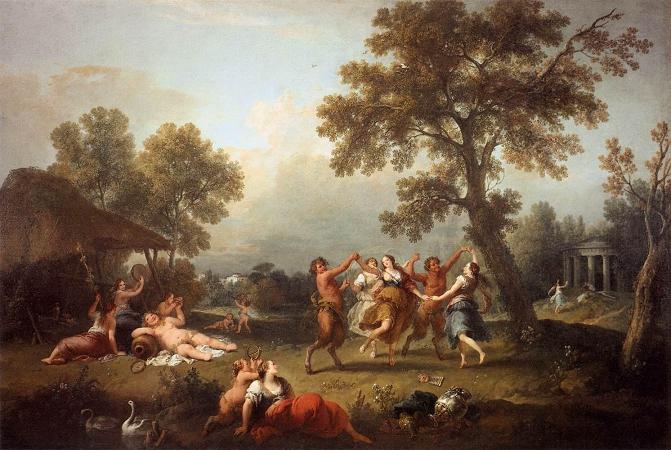Bacchanal (c-200). The Bacchanalia were Roman festivals of Bacchus based on various ecstatic elements of the Greek Dionysia. They seem to have been popular and well-organised throughout the central and southern Italian peninsula. They were almost certainly associated with Rome's native cult of Liber, and probably arrived in Rome itself around 200 BC. However, like all mystery religions of the ancient world, very little is known of their rites. Livy, writing some 200 years after the event, offers a scandalised, extremely colourful account of the Bacchanalia. Modern scholarship takes a skeptical approach to his allegations of frenzied rites, sexually violent initiations of both sexes, all ages and all social classes, and the cult as a murderous instrument of conspiracy against the state. Livy claims that seven thousand cult leaders and followers were arrested, and that most were executed. Senatorial legislation to reform the Bacchanalia in 186 BC attempted to control their size, organisation, and priesthoods, under threat of the death penalty. This may have been motivated less by the kind of lurid and dramatic rumours that Livy describes than by the senate's determination to assert its civil and religious authority over Rome and her allies, after the prolonged social, political and military crisis of the Second Punic War. The reformed Bacchanalia rites may have been merged with the Liberalia festival. Bacchus, Liber and Dionysus became virtually interchangeable from the late Republican era, and their mystery cults persisted well into the Principate of Roman Imperial era. The Bacchanalia were Roman festivals of Bacchus, the Greco-Roman god of wine, freedom, intoxication and ecstasy. They were based on the Greek Dionysia and the Dionysian mysteries, and probably arrived in Rome c. 200 BC via the Greek colonies in southern Italy, and from Etruria, Rome's northern neighbour. Like all mystery cults, the Bacchanalia were held in strict privacy, and initiates were bound to secrecy; what little is known of the cult and its rites derives from Greek and Roman literature, plays, statuary and paintings. Livy, the principal Roman literary source on the early Bacchanalia, as he reports a major political incident involving one form of the cult, names Paculla Annia, a Campanian priestess of Bacchus, as the founder of a private, unofficial Bacchanalia cult in Rome, based at the grove of Stimula, where the western slope of the Aventine Hill descends to the Tiber. The Aventine was an ethnically mixed district, strongly identified with Rome's plebeian class and the ingress of new and foreign cults. The wine and fertility god Liber Pater, divine patron of plebeian rights, freedoms and augury, had a long-established official cult in the nearby temple he shared with Ceres and Libera. Most Roman sources describe him as Rome's equivalent to Dionysus and Bacchus, both of whom were sometimes titled eleutherios. Livy claims the earliest version as open to women only, and held on three days of the year, in daylight; while in nearby Etruria, north of Rome, a Greek of humble origin, versed in sacrifices and soothsaying had established a nocturnal version, added wine and feasting to the mix, and thus acquired an enthusiastic following of women and men; Livy says that Paculla Annia corrupted Rome's unofficial but morally acceptable Bacchic cult by introducing the Etruscan version, with five, always nocturnal cult meetings a month, open to all social classes, ages and sexes, starting with her own sons; the new celebrations and initiations featured wine-fueled violence and violent sexual promiscuity, in which the screams of the abused were drowned out by the din of drums and cymbals. Those who resisted or betrayed the cult were disposed of. Under cover of religion, priests and acolytes broke civil, moral and religious laws with impunity. Livy also claims that while the cult held particular appeal to those of uneducated and fickle mind, such as the young, plebeians, women and men most like women, most of the city's population was involved, and even Rome's highest class was not immune.
more...













